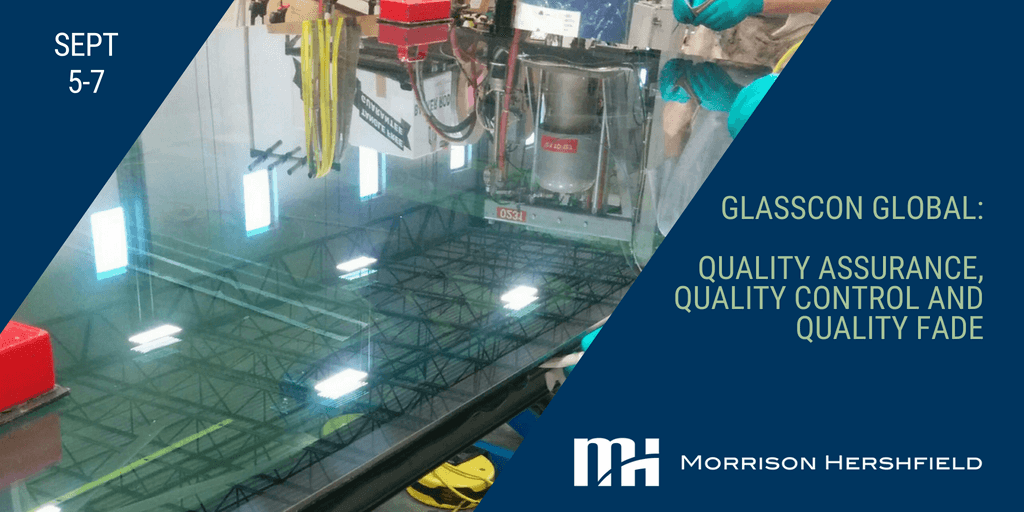
- This event has passed.
GlassCon Global: Quality Assurance, Quality Control and Quality Fade
September 5, 2018 at 8:00 am - September 7, 2018 at 5:00 pm UTC-5

GlassCon Global is North America’s premier Technical Conference, bringing together global innovations in glass technology to further the development of the glass and glazing industry. Our team is pleased to have two papers accepted at this year’s GlassCon Global Conference in Chicago, September 5-7, 2018.
Further information and registration can be found here.
Session Overview: Silicone Spandrel Glass Coatings: Mitigating Glass Breakage Risk from Thermal and Other Stresses
Curtain wall design commonly uses insulating glass units for vision and spandrel glazing to provide better visual harmonization of building façade glass. Risks with this design approach include higher thermal stresses, especially when low-emissivity coatings are used on insulating glass units in spandrel areas. Ceramic enamel frit – commonly used to opacify spandrel glass – is known to induce a bending strength reduction of up to 50%. The ability of ceramic enamel frit coated glass to resist thermal stress is similarly reduced. Multiple incidences of thermal stress related fracture have occurred with heat-strengthened, ceramic enamel frit opacified spandrel glass. An increased chance of spontaneous breakage, by nickel sulfide inclusions, may occur if ceramic enamel frit opacified spandrel glass is fully-tempered to withstand the thermal stresses that it is exposed to.
Silicone spandrel glass coatings have been examined as a solution to prevent the strength reduction in heat-treated glass when ceramic enamel frit is applied as an opacifier. Four-point bending tests were used to investigate the flexural strength of coated heat-strengthened and fully-tempered glass. Ball drop testing was used to investigate the impact resistance of coated fully-tempered glass.
Co-Author: Stéphane Hoffman, Vice President, co-authored the paper Silicone Spandrel Glass Coatings: Mitigating Glass Breakage Risk from Thermal and Other Stresses. This paper will be presented by Chris Fronsoe.
Date & Time: Thursday, September 6 at 2:45 p.m.
Session Overview: Quality Assurance, Quality Control and Quality Fade
The need to demonstrate fiscal responsibility for public and private sector building projects typically drives owners, construction managers and general contractors in North America to consider cost savings available through the global supply chain. Global procurement is often relied upon for curtain wall, window wall and other fenestration systems and components. Global procurement has its opportunities and risks. Opportunities include reduced product cost and fabrication capabilities that are not available, or have only limited availability in North America such as jumbo-size low-emissivity coated glass and insulating glass units. Risks include language and cultural differences and long distance communication across many time zones causing confusion in design, ordering, delays in delivery, and problems with product quality. Nevertheless, the fiscal advantages can be considerable.
Ensuring acceptable quality off-shore products is not just a matter of writing into a specification a requirement to comply with applicable building codes, standards and industry practice documents. These technical documents contain surprising limitations and omissions so that despite best efforts, a Quality Assurance (QA) plan and Quality Control (QC) program may not achieve the desired quality outcome. Even if initial product quality samples and production are correct, quality may diminish over time, an effect known as Quality fade (QF).
To be fair, QA, QC and QF can be an issue with domestic producers also. The same latitude in industry practices and standards available to off-shore suppliers is, of course, available to domestic suppliers. So whether or not fenestration systems are globally or locally procured, the building owners, the design team and the construction team should be aware of omissions and limitations of industry practices and standards to avoid unexpected surprises too late in the construction process to make changes.
Presenter: George Torok, Building Science Specialist, will be presenting his paper Quality Assurance, Quality Control and Quality Fade: An Alphabet Soup of Compliance Standards is not Enough. This paper was co-authored by Yvon Chiasson, Building Science Specialist.
Date & Time: Friday, September 7 at 1:30 p.m.
About our Speaker:

George brings a unique breadth and depth of experience to every project, with over 30 years of experience in building enclosure design, construction, performance assessment, failure investigation and rehabilitation for public and private sector buildings of all types across North America. George is a member of Morrison Hershfield’s Façade Engineering Team, working with building owners and design teams to achieve balanced, practical and innovative solutions, and providing peer support and mentoring internally. His focus is fenestration technology, including low-rise residential windows, doors and skylights, high-rise residential window wall, commercial curtain wall and custom, one-of-a-kind glazed architectural structures.